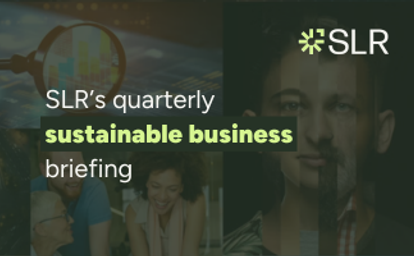
Greed is good
- Post Date
- 22 July 2025
- Read Time
- 8 minutes

Can companies maintain profit-driven creativity while serving society?
A few weeks ago, I chaired a debate on the motion “Greed is Good”.
It was a brilliant and provocative title from the Institute of Corporate Responsibility and Sustainability (ICRS) [1], and over a couple of hours, a panel of academics and practitioners led the audience in a lively battle of ideas. And all in the magnificent setting of the Great Room at the Royal Society of Arts in London’s Adelphi.
Now, as I said in my introductions, none of the debaters were arguing that greed – per se – is a good or noble thing. Philosophers and religions throughout history have tended to side with altruism, selflessness, and generosity. Arguing publicly for the opposite, especially in a room full of sustainability professionals, is – you would imagine – a non-starter.
And yet, ‘Team Greed’ (they would hate me saying that) comprehensively won the debate. A show of hands before and after had well over half the audience leaning their way. The reason – and the argument – is interesting to unpack.
The business of business is business
‘Team Greed’ didn’t really argue that greed was – in itself – a good thing. Instead, they recalled the ideas of Milton Friedman and Adam Smith, who famously said, “It is not from the benevolence of the butcher, the brewer, or the baker that we expect our dinner, but from their regard to their own self-interest.” Companies are there to meet the needs of society; it is in supplying our wants that they return a profit. The system aligns the – understandably human – desire of the tradesperson to turn a profit with our need for a service performed. That is the basis of our capitalist system, with all its successes and failings: Adam Smith’s companies brought us food, water, clothes, and shelter – and these days they add mobile phones, gadgets, and entertainment. Hurrah for business!
But of course, business isn’t always a force for good. Let’s remember Collateralised Debt Obligations wrecking the global economy in 2008. Let’s remember runaway consumerism and climate breakdown. Shadowy lobbying. Iniquitous bonuses. Pensions mis-selling. Toxic rivers. The list is long and shameful. Companies are left to run free in pursuit of profit, rewarding the investor, while hurting the rest of us.
The real debate lies in understanding the causes and solutions to such problems. I think that most people in that room in the RSA – at least when they walked in – sided somewhat unthinkingly with the view that capitalism is a necessary evil with selfish, abusive tendencies needing strict control. Perhaps that’s why they made a career in corporate responsibility. How much of the funding can we divert to good causes? How can we control our executive? How can we ensure businesses have no place to hide in their corporate reporting?
How can we recover the soul of business? How can we give it a noble purpose?
Milton Friedman anticipated this angle. His view was that the capitalist purpose of business was noble enough. ‘The business of business is business’ he said. Every dollar diverted, every hour mis-spent makes for a weaker company and a lower return for society.
So, how do we pull companies into line? How can we keep the creative energy of the profit motive, while ensuring that companies properly serve the interests of society? We remember that, even in the reddest-tooth models of capitalism, the corporation is a construct – a created entity – given licence by society to operate in return for the benefits it creates. That licence can be withdrawn.
This matters. Getting our thinking straight at this level is the foundation of the corporate control systems we subsequently deploy. Clear thinking about the causes leads to clear thinking about the solutions.
Mixing oil and water
The first framing is the moral one. In this view of the world, we observe the failings of business – inequity, deceit, carelessness towards the environment – and we conflate that with human moral codes. We deploy moral arguments against a corporate entity. Companies become either nice or nasty.
There are some grave problems with this. The most obvious is that the company isn’t a moral entity. It’s made up of thousands of people – some nice and some nasty — and (usually) paid for by thousands of shareholders. How can it possibly be said to have one set of values? How can it ‘care’?
The second is that – logically – the people in companies aren’t that different to the rest of us. They are, on the whole, no greedier, no less caring about the environment, no less capable of feeling or empathising than anyone else. Sure, there may be a bit of ‘natural selection’ to prefer ruthlessness near the top, but the private sector employs 82% of the UK workforce [2]. They can’t all be baddies.
The web of incentives
I would argue that, if we want to understand this clearly, we should tackle a very different set of questions. If they aren’t morally deficient, why do people running companies act as they do? Why do they put so much pressure on workers? Why do they seek political influence? Why do they damage the environment?
The answer lies in incentives, systems, market failures, and regulations.Businesses are profit-maximising entities, just as tigers eat meat and water flows downhill. They look at a market with its complex web of consumer interests, competitive forces, and regulatory constraints, and they chart their course to maximum return.
Most advanced economies have business conduct rules set out in law obliging businesses to conform to the consensus moral standards of society. They mustn’t lie, cheat or steal.
But beyond that, they play the game. If it’s more profitable for a company to legally dump its waste than treat it, we shouldn’t wring our hands and say it’s being naughty. It’s doing exactly what one would expect given the way the market is set up.
If no one in society wants to buy expensive, unreliable renewable technologies, we can’t blame companies for not selling them.They will stick to the cheap, fossil-fuelled, and single-use original.
And if we want workers in the developing world to be paid better, we need to understand where the costs are externalised in offering us a $2 t-shirt – social insurance, pollution and workers’ rights being a good place to start.
The conclusion from this line of argument is simple: if we want companies to behave differently, we need to adjust the reward framework. Impose a polluter-pays fine on the waste dumper. Encourage investment and development into renewables to the point at which they are must-have no-brainers. Insist on product provenance on the label to empower the consumer.
Back to the debate
Back in the RSA, I sensed that this way of thinking – the corporation as a force for profit, being directed by the hand of the market – was news to many in the room. As an old-stager in this field, I need to take some of the blame here. Once upon a time, every Board presentation I made centred on the financial case for responsible action and the direct link to profit.
With ‘Corporate Sustainability’ now two decades old and an established idea, many of us have forgotten those disciplines of business case, economic rigour, and externalities. We’ve shorthanded to the moral heuristic (“I want my company to do the right thing and be a good citizen”), forgetting where these imperatives come from and – in reverse – where the barriers lie.
This shortcut has real-world consequences. Our businesses have certainly responded to accusations of moral failing with moral pronouncements. The risk is great frustration in society, when the mask slips and we revert to talking about profit. Look, for example, at the rowing back from companies’ optimistic net zero commitments that we will discuss later in this digest, or the challenges of squaring investment, profit, and discharges in the water sector. Don’t talk about noble purpose unless you can afford to deliver.
So, what’s our advice? Like the audience in the Great Room, we encourage companies to re-embrace the business argument for sustainability. Be careful about statements of ethics and morals; let the business case do the talking. Explain externally and internally why you are investing, and don’t be afraid to talk numbers and the business benefit. And where the market isn’t ready, or doesn’t let you move forward, be prepared to say so explicitly.
Because, in the end, the mission to make business sustainable is too urgent and too important for false starts, row backs, and dead ends.
Advisory Digest
Enjoyed this article? For more like it, get SLR's quarterly sustainable business briefing straight to your inbox.
Sign up
-----------------------------------------
The event was hosted by the ICRS with the debate panellists being:
- Victoria Price, Managing Director, Alvarez & Marsal Tax LLC.
- Bryan Cheang, Research Fellow at LSE and King’s College London
- Isabel Kelly, Founder, Profit with Purpose
- Áine Clarke, Head of investor strategy, Business & Human Rights Resource Centre.
Parts of this article were originally published by The Guardian, under the title “Why do Good Companies do Bad Things?”[3]
-----------------------------------------
References:

